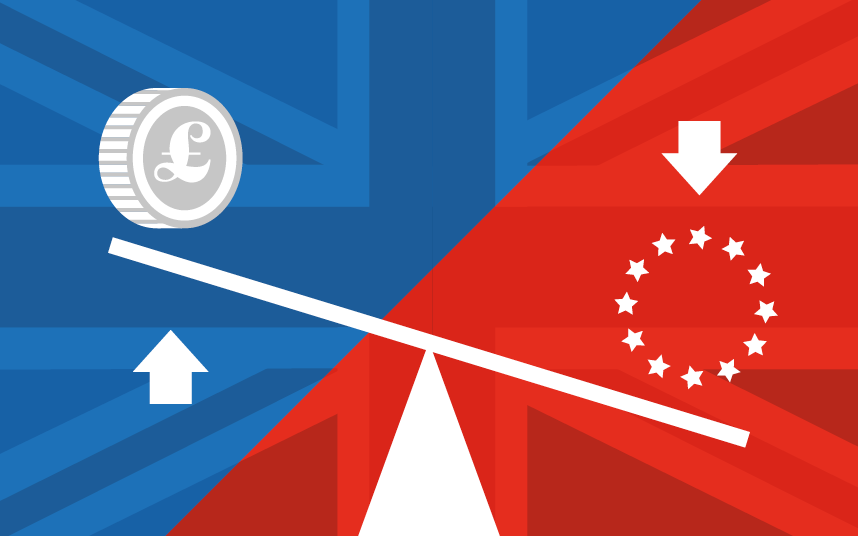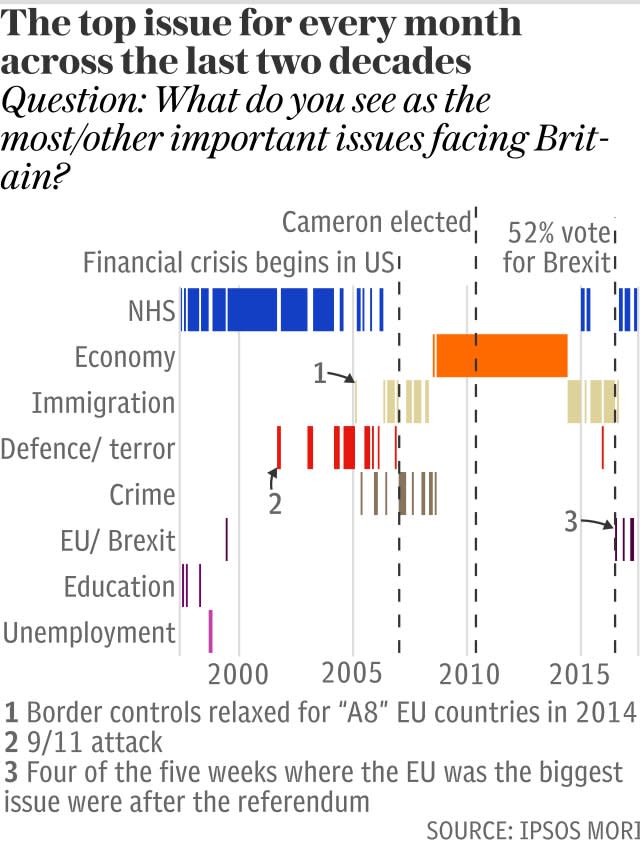Britain doesn't care about the economy now - here's what worries us instead

After last year's vote for Brexit and this year's shock rise of Jeremy Corbyn, you wouldn't be wrong in thinking that politics is becoming unpredictable.
But polling from Ipsos MORI, which tracks the public's concern about the key topics of the day, can tell us about the underlying mood that has influenced such decisions.
It can tell us, for example, that just a quarter of people are concerned about the economy, and more than half are worried about the NHS - while 42 per cent of us think Brexit is the biggest issue facing the UK.
But how has concern about these issues changed over time? And how have such worries influenced our politics?
For each of these issues, we'll ask you whether you think they've become more or less of an issue for the British public since David Cameron took over as Prime Minister in 2010.
Ever-present money troubles
Ever since the financial crash in 2007 and 2008, concern about the economy has skyrocketed.
Banks had to be bailed out with massive sums of money, and several countries saw their economies shrink in the Great Recession.
Such concern about the recession and the subsequent debt helped David Cameron, who promised public sector cuts to reduce the deficit, get into Downing Street.
Brexit negotiations loom on the horizon
Brexit is certainly one of the biggest issues facing the country as a result of the 2016 EU referendum that saw 52 per cent of the country vote Leave.
Article 50 was triggered in March, meaning that the UK now has two years to negotiate its withdrawal from the European Union.
But historically, the British people have not really seen the European Union as a big deal. Since 1997, there have only been five months where the EU has been the public's biggest concern.
Immigration debate rumbles on
Immigration first became the most important concern for the British public in February 2005, and has since become one of the biggest issues in the country
Along with the economy and Brexit, concern about immigration peaked before the EU referendum - when net migration stood at three times the Government's target.
In September 2015, more than half of the public listed it as one of their biggest concerns, and the issue remained a key concern for around two in five people until the Brexit vote.
Since the referendum, however, people began to see it as less of a problem, perhaps as a result of people thinking that net migration could fall when the UK leaves the EU.
Views on the Tories' unemployment record
Unemploymenthas been the country's biggest concern for just two months in the last 20 years - in October and November of 1998.
With the introduction of the minimum wage and a decline in unemployment, concern about the issue fell - until the Great Recession.
As unemployment increased after the financial crisis, concern began to increase as well - with as many as two in five people being worried about it in 2012.
Under the shadow of terror
The public's interest in terrorism and defence spikes around terror attacks and military interventions, before returning to a similar level after a month.
Events such as the 9/11 attacks, the 7/7 London bombing, the bombing of ISIS in Syria and the London Bridge attack all triggered an immediate spike in concern about terrorism, defence and foreign affairs.
In general, however, these topics became bigger issues for the British public after 9/11, with concern about them rarely falling below 10 per cent.
Worries about the NHS and public services
The NHS is precious to the British public, and this is unsurprisingly reflected in the Ipsos MORI data that shows that the health service is one of our biggest concerns.
Over the last 20 years, the NHS has been our biggest concern for 85 months - the most of any issue. The economy is the second most fretted-about issue, being top for 66 months.
Concern about the NHS reached its lowest point for two decades in 2008, but there has been huge movement in the number of people saying it's a major concern for them recently.
What is the top issue for the British public?
Across the years, there are two things that the British public seem to swing between in their concern: the economy and public services.
As a result of the financial crisis, the economy became the single biggest issue for the British public between September 2008 and June 2014.
Once the economy had returned to consistent growth, however, the usual issues began to take hold again - such as the NHS. The health service returned as the top issue in January 2015 - after another tough winter that saw the health service cope with demand.

There has, however, been an increase in concern about two key issues over the last two decades: immigration and the European Union.
Concern over immigration gradually increased at the same time as net migration did, but worries about the EU only picked up during the EU referendum campaign.
Fewer than one in five people said that the EU was a concern between 2001 and when Cameron set the date of the referendum, but after that point, concern about this issue reached as high as 51 per cent in March 2017.

 Yahoo News
Yahoo News 
